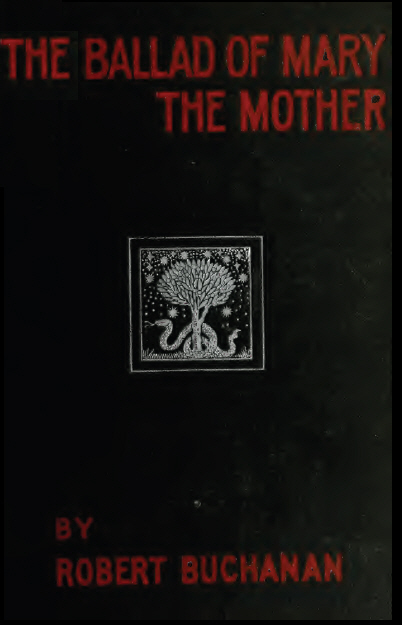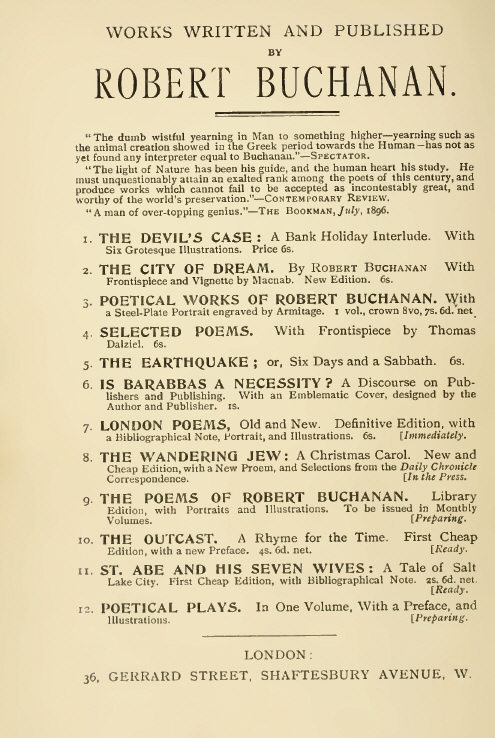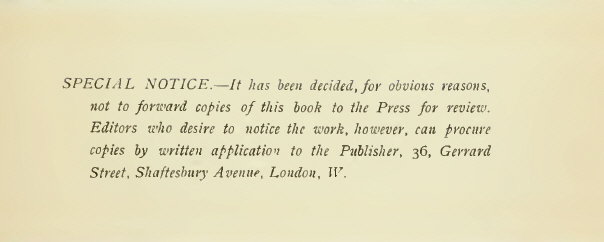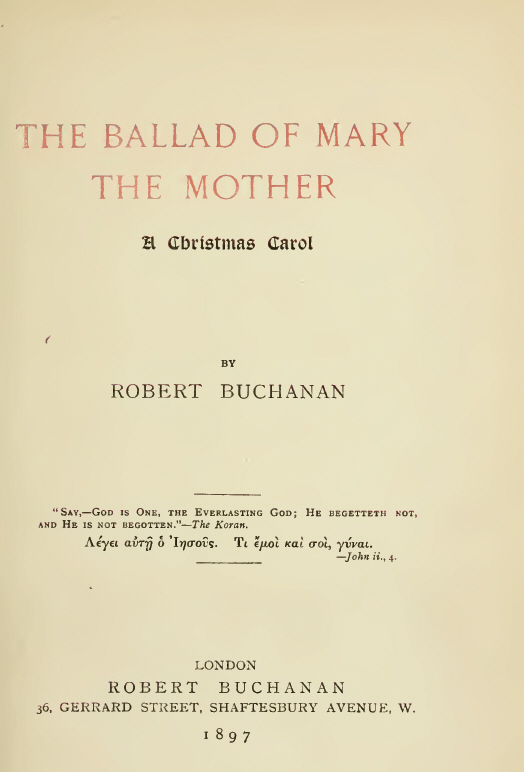ROBERT WILLIAMS BUCHANAN (1841 - 1901)
|
ROBERT WILLIAMS BUCHANAN (1841 - 1901) |
|
|
|
|
|
|
|
|
THE BALLAD OF MARY THE MOTHER |
 |
|
_____ THE BALLAD OF MARY THE MOTHER _____ |
 |
|||||
 |
|||||
 |
|||||
|
SPECIAL NOTICE.—It has been decided, for obvious reasons, _____
THE BALLAD OF MARY THE MOTHER
A Christmas Carol
BY ROBERT BUCHANAN
_____ “SAY,—GOD IS ONE, THE EVERLASTING GOD; HE BEGETTETH NOT, |
|
—John ii., 4.
LONDON ROBERT BUCHANAN 36, GERRARD STREET, SHAFTESBURY AVENUE, W. 1897 _____
LONDON: _____
PAGE “SHEPHERDS, WAKE, IT IS CHRISTMAS-TIDE . . . .” vii THE BALLAD OF MARY THE MOTHER ... ... 1 AD MADONNAM ... ... ... ... ... ... 103 A CATECHISM ... ... ... ... ... ... 115 ANTIPHONES ... ... ... ... ... ... 127 L’ENVOI ... ... ... ... ... ... 141 PROSE NOTE ... ... ... ... ... ... 147
[Notes: I have been unable (so far) to find any contemporary reviews of The Ballad of Mary the Mother. Whether this is due to Buchanan’s decision not to send out review copies, or whether it is the nature of the poem itself, I do not know. Archibald Stodart-Walker in The Poet of Modern Revolt, after summarisng the poem, wrote: “This is a hasty view of a poem written with more searching of heart, we conceive, than anything the poet had yet ventured. The blessed sanctity of motherhood, which has always stood high in the creed of the poet, is made the theme of the ballad, and the uselessness of the whole aspiration, together with the human misery it evoked, has touched the poet to speak these words, despite all temptation to the contrary. From a poetical point of view, ‘The Ballad of Mary the Mother’ stands high, in our opinion, amongst the poet’s best work. For its very fearlessness of expression, combined with its simplicity of language, a simplicity which faithfully reflects the spirit and tone of the Gospel, it remains an important contribution to the poetical literature of religion. There is none of the fiery rhetoric of ‘The Wandering Jew,’ little of the mysticism of ‘The Book of Orm’ and ‘The City of Dream,’ or even of the ballad of the same metre, ‘The Ballad of Judas Iscariot’; but from its faithfulness to Eastern colour, its remarkable poetic reproduction of the scriptural records, and its never-halting metre, the poem must be regarded as part of the vanguard of Mr. Buchanan’s endeavour.” John A. Cassidy in Robert W. Buchanan (p. 118), introduces his précis of the poem with the following: “The theme of The Ballad of Mary the Mother is the sublimity of mother-love, but here also is the strain of the outcast. In this case, the outcast is Buchanan himself; he is cast out by other men because he cannot accept Christ as the Son of God. The story of Jesus, as Buchanan sees it, is what he presents in one of the most startling and powerful of all his poems.” In my own opinion, it is the best of Buchanan’s long religious poems - perhaps because it is not too long - Buchanan keeps to his theme and does not wander. There is also a sense (as Cassidy points out) of a personal connection between this retelling of the life of Jesus, through his mother’s eyes, with Buchanan’s own life and his relationship with his mother. The death of Buchanan’s mother seemed to affect him much more than the deaths of his father, his wife, and his friends, David Gray and Roden Noel. Coming just a few months after his bankruptcy in 1894, one wonders whether Buchanan blamed himself for her death. Although I would not press the comparison too far, I do think that one can discern feelings of both grief and guilt in The Ballad of Mary the Mother which contribute to its power. ‘Remarkable’, ‘startling’ and ‘powerful’ and for some reason, totally forgotten.] _____
|
|
|
|
|
|
|